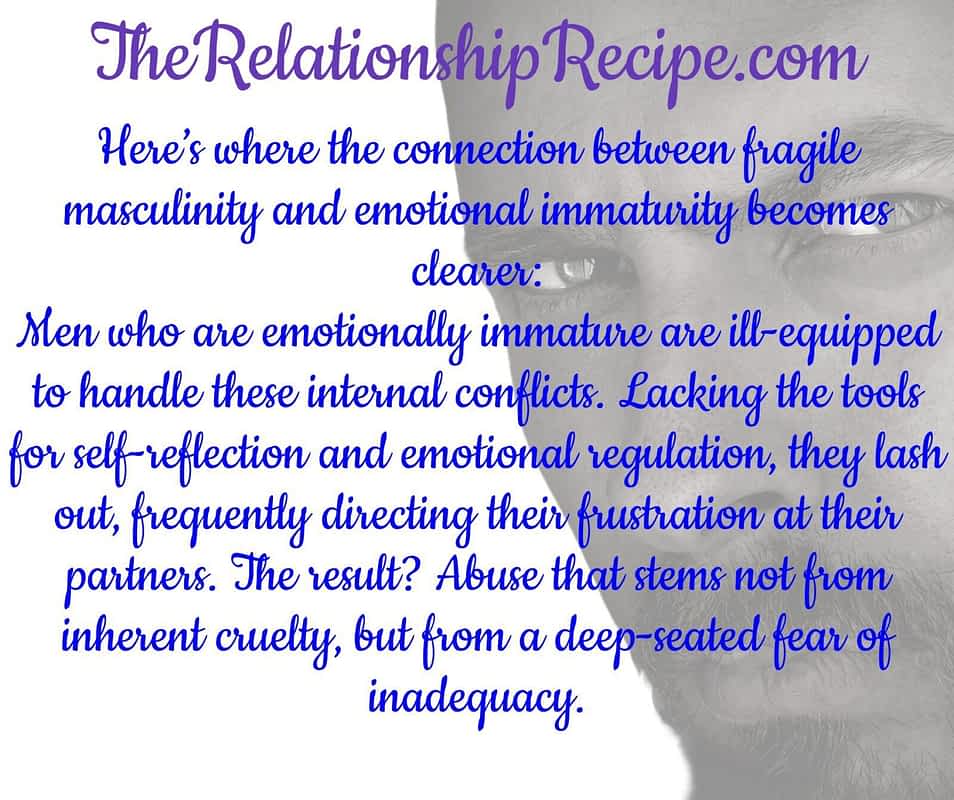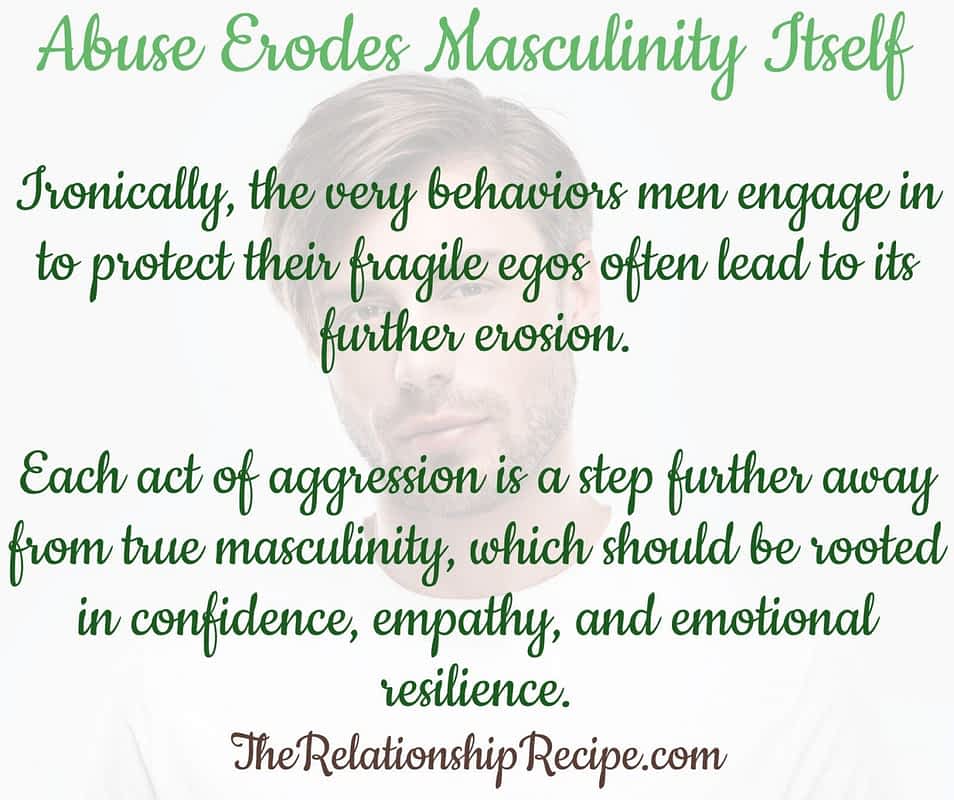The Link Between Fragile Masculinity and Abuse in Relationships
Fragile masculinity isn’t just annoying. It’s dangerous. When a guy’s self-worth is hanging by the thread of outdated gender roles and a shaky sense of manhood, it’s not just his problem. It becomes your problem, especially in a relationship. This is where fragile masculinity and abuse often collide, dragging emotional immaturity right into the mix, and turning what could’ve been love into a psychological minefield.
We talk a lot about toxic masculinity, control issues, and insecure partners, but we rarely connect the dots. Male fragility and violence aren’t random. They’re part of a pattern. And that pattern usually starts with a guy who’s been told that being “a real man” means never showing weakness, always being in control, and expecting the world (and his partner) to revolve around his ego.
Fragile male egos and entitlement don’t mix well with healthy relationships. In fact, they’re usually the root of emotional manipulation, jealousy masked as love, and power dynamics that make your relationship feel more like a battleground than a partnership.
Recently, I’ve written several rather eye-opening posts on how fragile masculinity is the root of controlling behavior in relationships, the psychological underpinnings between male fragility and abuse. All of these articles are interconnected with the topic of fragile male egos and entitlement in relationships. Today, I will be tying these all together for you.
💡Key Highlights
- How fragile masculinity and abuse connect and fuel toxic relationship dynamics
- Why male fragility and violence often stem from deep insecurities, not just anger
- The role of fragile male egos and entitlement in escalating abusive behaviors
- How emotional immaturity traps men in cycles of control and manipulation

How Fragile Masculinity and Abuse Are Connected
Fragile masculinity isn’t just about a guy being “insecure.” It runs deeper. It’s built on a relentless pressure to live up to some outdated, macho checklist of what a “real man” is supposed to be: tough, dominant, emotionally dead inside, and God forbid he ever cries or asks for help.
So what happens when reality doesn’t match that fantasy? When his partner calls him out, life doesn’t hand him the control he thinks he’s owed, or emotions creep in that he’s never been allowed to feel? Fragile male egos and entitlement have a nasty habit of morphing into controlling, manipulative, or flat-out abusive behavior.
That’s the toxic cycle. Male fragility and violence don’t come out of nowhere – they’re symptoms of a deeper identity crisis fueled by rigid gender norms. And when masculinity sits on a foundation that unstable, anything that even slightly threatens it becomes an excuse to lash out. That’s where the damage happens – not just to him, but to everyone in his orbit.

Here’s where the dots really connect: emotional immaturity, fragile masculinity, and abuse aren’t separate issues. In fact, they feed off each other.
Emotionally stunted men don’t have the range (or the will) to deal with their own inner chaos. Instead of facing their fears, they project them. No emotional regulation, no accountability – just spontaneous reactions and blame games. And guess who usually ends up in the line of fire? You.
The worst part is a lot of this abuse doesn’t come from some mustache-twirling villain. It comes from a guy terrified of not being “enough.” But instead of unpacking that fear, he masks it with control, defensiveness, or outright aggression. It’s not so much that it’s inherent cruelty on their part; it’s a fragile ego flailing to survive.

How Male Fragility and Violence in Relationships Intersect
Abuse in relationships isn’t always some grand scheme for power; it’s often just a messy, impulsive reaction to a bruised ego. Fragile masculinity doesn’t do well with criticism, boundaries, or anything that remotely feels like a threat to its identity. Poke that shaky sense of self, and you’ll see just how fast things can spiral.
Instead of taking a breath and asking why they’re triggered, emotionally immature men go straight into panic mode. And when their emotional toolbox is empty, they reach for what they do know: manipulation, coercion, or just plain aggression. The goal is to reassert control and protect that crumbling sense of self; aka fragile male egos and entitlement in action.
They’re not interested in healthy conflict resolution. Vulnerability is off-limits. So what’s left? A toxic loop where fear feeds control, control breeds resentment, and male fragility and violence show up like clockwork. And that’s how fragile masculinity and abuse keep each other alive in a cycle that turns love into a battleground.

This kind of behavior, rooted in a guy’s fragile ego isn’t always obvious. That’s what makes it so dangerous. It slides in quietly, masked as “normal relationship stuff,” and before you know it, you’re second-guessing whether what just happened was even a big deal.
It starts small. A guy downplays your accomplishments just to make himself feel bigger. He casually mocks your opinions so he can feel like the smartest one in the room. These aren’t harmless quirks – they’re warning signs. Little power plays meant to protect his ego while chipping away at yours.
These microaggressions aren’t random; they’re part of a pattern. One rooted in emotional immaturity and driven by a deep fear of being outshined. And as they pile up, they create a toxic environment where you’re constantly walking on eggshells. It’s not a misunderstanding – it’s manipulation. It gets harder to spot the longer you’re stuck in it.

The Mask of Emotional Immaturity: How Fragile Male Egos and Entitlement Are Linked
Emotional immaturity isn’t just about struggling to express feelings – it’s running from them. Men wrapped up in fragile masculinity and abuse don’t just avoid vulnerability; they see it as an attack on everything their identity depends on. Admitting to fear or doubt would mean cracking the carefully built shell of control and confidence they’ve been hiding behind.
The reality is fragile male egos and entitlement don’t exactly make room for introspection. These guys aren’t interested in growth: they’re interested in preserving the illusion that they’re always in charge. So instead of doing the emotional work, they lean into control, bravado, and manipulation.
That’s how you end up with relationships stuck in a juvenile headspace. It’s where emotional depth is swapped for dominance, and real intimacy gets twisted into a performance. They avoid tough conversations not because they’re clueless, but because deep down, they’re afraid. Afraid of being exposed, of being “less than,” of not living up to some warped standard of masculinity.
And when that fear festers, it turns into resentment. That’s where male fragility and violence can enter the picture; not because they’re inherently cruel, but because they’ve never been taught how to deal with being emotionally challenged in a healthy way.

Fragile Masculinity and Abuse is Rooted in Emotional Immaturity
Abuse usually sparks when the fragile male ego collides with emotional immaturity and a straight-up fear of vulnerability. When a guy’s whole sense of manhood is built on shaky ground, any challenge feels like a personal attack that demands an aggressive comeback.
Throw in emotional underdevelopment, and you’ve got a recipe for disaster. These men can’t (or won’t) process their feelings in a healthy way. Instead, they lash out, using abuse as a twisted tool to reclaim control and protect their fragile sense of self.
And here’s the kicker: the more insecure they feel, the harder they double down on this toxic behavior. It’s a vicious cycle where violence becomes the go-to response, fueled by fragile male egos and entitlement that refuse to admit weakness. The result is a false show of dominance masking a mess of deep insecurities, and a relationship caught in the crossfire.

How Fragile Masculinity and Abuse Erodes Masculinity Itself
Here’s the irony: the very behaviors these men use to protect their fragile male egos and entitlement actually tear those egos down even more. Abuse, whether it’s physical, emotional, or psychological—doesn’t just wreck the person on the receiving end; it chips away at the abuser’s sense of self too.
Every act of aggression pushes them further from what real masculinity should look like; something built on confidence, empathy, and the ability to handle emotions like an adult instead of a scared kid hiding behind a wall of control.

Breaking the Cycle of Fragile Male Egos and Entitlement
Breaking the cycle of fragile masculinity and abuse starts with getting why emotional immaturity is the root of the problem. It’s not just about individual guys: it’s a cultural reset we need. We have to push men to rethink what masculinity really means – one that actually welcomes vulnerability and emotional growth instead of shaming it.
Real strength isn’t about how much you can dominate or control. It’s about how well you can handle your emotions without flipping out or shutting down.
That means teaching boys early on that feeling things, and talking about those feelings, is not just okay, it’s essential. If we raise a generation that’s comfortable with emotional honesty, fragile egos and entitlement won’t have so much power to mess up relationships.
For the guys already caught up in this toxic cycle, therapy isn’t a weakness – it’s a lifeline. Professional help can break down those deep insecurities, teach healthier ways to cope, and stop abusive behaviors before they do more damage.

Final Thoughts: Redefining Masculinity for a Healthier Future
Redefining masculinity isn’t just some feel-good idea; it’s the real key to breaking the cycle of fragile masculinity and abuse. The link between fragile masculinity, abuse, and emotional immaturity runs deep, but it doesn’t have to trap anyone forever. When we start teaching emotional intelligence and ditch outdated, toxic expectations of what it means to “be a man,” we open the door for guys to show up as their real, messy, authentic selves without resorting to abuse or controlling behavior.
Real strength isn’t about hiding your vulnerabilities or flexing dominance. It’s having the guts to face those tough feelings head-on and deal with them like an adult.
This post may contain affiliate links. I earn from qualifying Amazon purchases at no extra cost to you. This content is for informational purposes only and is not a substitute for professional advice. Read full disclaimer.
Thank you for reading this post, don't forget to subscribe!







